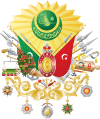Fahriye Sultan
| Fahriye Sultan | |
|---|---|
| Died | c. 1656 Constantinople, Ottoman Empire (present day Istanbul, Turkey) |
| Burial | Murad III Mausoleum, Hagia Sophia Mosque[1] |
| Spouse |
Çuhadar Ahmed Pasha
(m. 1604; died 1618)Sofu Bayram Pasha
(m. 1618; died 1632)Deli Dilaver Pasha |
| Dynasty | Ottoman |
| Father | Murad III |
| Mother | Safiye Sultan (disputed) |
| Religion | Sunni Islam |
Fahriye Sultan[2] (Ottoman Turkish: فخری سلطان, "honorary"; also Fahri Sultan;[2][3]: 168 died c. 1656[3]: 168 ), was an Ottoman princess, daughter of Sultan Murad III (reign 1574–1595) of the Ottoman Empire, and maybe of his favorite Safiye Sultan.[4]
Biography
[edit]Her mother possibly was Safiye Sultan if she born after Safiye's return from exile in the Old Palace in 1584.[5]
In 1595 her father died and her brother, Mehmed III ascended to the throne.[6] In 1603 her brother died and her thirteen-year-old nephew, Ahmed I, ascended to the throne. Ahmed married Fahriye to Çuhadar Ahmed Pasha in 1604. The marriage remained childless and the pasha died in 1618. When Osman II deposed Mustafa I, Fahriye lived in the palace and received the same salary as other members of the dynasty. Her second husband was Sofu Bayram Pasha.[7][3]: 168 She married in 1618 and was widowed at his death in 1632.[8] Her third husband was Deli Dilaver Pasha.[3][9]
During the reign of sultan Murad IV, her stipend was 430 aspers a day.[7] She is known to receive gifts from the Ragusans from the 1640s all up until the 1650s.[3]: 168 However, once she was deliberately overlooked for reasons unknown, likely driven by a reduction in public spending. After waiting a year, she instructed her kethüda to inquire with the ambassadors about why their predecessors didn't provide her entitled privileges. When the ambassadors showed no inclination to rectify the situation, she sought the intervention of the grand vizier, sending a copy to Caboga, the Ragusan ambassador. The outcome remains uncertain.[3]
In popular culture
[edit]In the 2015 TV series Muhteşem Yüzyıl: Kösem, Fahriye Sultan is portrayed by Turkish actress Gülcan Arslan.[10]
References
[edit]- ^ Demircanlı, Y.Y. (1989). İstanbul mimarisi için kaynak olarak Evliya Çelebi Seyahatnamesi. Seyahatname. Vakıflar Genel Müdürlüğü. p. 599. ISBN 978-975-19-0121-7.
- ^ a b Kahya, Ozan (2011). "11 numaralı İstanbul Mahkemesi defteri (H.1073) : tahlil ve metin". pp. 219, 303–304.
- ^ a b c d e f g Miović, Vesna (2018-05-02). "Per favore della Soltana: moćne osmanske žene i dubrovački diplomati". Anali Zavoda Za Povijesne Znanosti Hrvatske Akademije Znanosti i Umjetnosti U Dubrovniku (in Croatian). 56 (56/1): 147–197. doi:10.21857/mwo1vczp2y. ISSN 1330-0598.
- ^ Uluçay, M. Çağatay (2001). Padişahların kadınları ve kızları [The women and daughters of the sultans] (4. basım ed.). Ankara: Türk Tarih Kurumu Basımevi. ISBN 978-975-437-840-5. OCLC 949604569.
- ^ Sakaoğlu, Necdet (2008). Bu mülkün kadın sultanları: valide sultanlar, hatunlar, hasekiler, kadınefendiler, sultanefendiler. Oğlak bilimsel kitaplar. İstanbul: Oğlak Yayıncılık ve Reklamcılık. ISBN 978-975-329-623-6.
- ^ Pazan, İbrahim (2023-06-06). "A Comparison of Seyyid Lokman's Records of the Birth, Death and Wedding Dates of Members of Ottoman Dynasty (1566-1595) with the Records in Ottoman Chronicles". Marmara Türkiyat Araştırmaları Dergisi. 10 (1). Marmara University: 245–271. doi:10.16985/mtad.1120498. ISSN 2148-6743.
- ^ a b Dumas, Juliette (2013). Les perles de nacre du sultanat: Les princesses ottomanes (mi-XVe – mi-XVIIIe siècle). p. 464.
- ^ Ayvansarayî, H.H.; Derin, F.Ç. (1978). Vefeyât-ı selâtîn ve meşâhı̂r-i ricâl. Yayınlar (İstanbul Üniversitesi. Edebiyat Fakültesi). Edebiyat Fakültesi Matbaası. p. 45.
- ^ a b Cikar, J. (2011). Türkischer Biographischer Index. De Gruyter. p. 290. ISBN 978-3-11-096577-3.
- ^ Tunca Bengin (November 19, 2015). "Muhteşem Yüzyıl Kösem Fahriye Sultan Kimdir?". Milliyet (in Turkish). Retrieved February 22, 2024.

